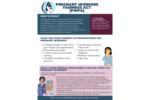If it's not fun, why do it?
I read a bumper sticker in the parking lot of my alma mater -- "If it's not fun, why do it?" I hoped to stick around long enough to speak to the driver -- Did he or she know how much his parents were spending on his education? Did he or she care?
But alas, the driver did not show up.
"If it's not fun, why do it?" At best it is simply glib and amusing. At worst it's a lie that sets us up for failure. How do we develop discipline and diligence in a culture that celebrates ease and comfort?
Let's face it, parents and educators have stiff competition. The media with its seductive and omnipresent stimuli awakens new desires all the time and creates a sense of urgency in young people about what they need to be happy, hip and satisfied.
How do we begin to compete?
Last spring I was copied on an email a parent sent to one of our history teachers: "Thank you so much for a delightful ride home from school today. My daughter was telling me that history was a highlight. She spoke about the national debt, valuation of currency, the cost of war and more. We have a 45-minute ride home and were still talking about Czars Nicholas and Alexander, then about the war in Afghanistan, as we pulled into the garage. Thank you for helping us raise a daughter who understands that learning about history will enable her to function more responsibly as a citizen."
Great educators feed students' desires for lasting satisfaction. They teach self-mastery by cultivating students' taste for what it means to engage life fully. In setting limits to their "fun" and empowering them with habits that sustain engagement in purposeful work, they help students discover a new and deeper level of enjoyment.
During last period on a Friday afternoon I visited a pre-calculus class learning how to solve systems of equations using matrices and the Guassian elimination method. "It is a challenging process involving many steps," the teacher explained. "What makes it particularly difficult is that there is no right way. It is sort of like a maze. You can start down one path and realize you aren't going to get where you want to, so you have to retrace your steps and try another way. It can be quite frustrating but extremely rewarding when you get the right answer!"
As the girls enthusiastically scribbled solutions, compared notes and started over, I was unable to capture the attention of a student with whom I had hoped to speak.
"If it's not fun, why do it?" Cognitive science reminds us that our brains only develop and grow when faced with increasingly challenging tasks. Mistakes, which aren't particularly fun, are infinitely valuable to our growth. Habits of self-mastery give us the fortitude and resilience to face those mistakes squarely and learn from them. Similarly, as we strive to walk in Christ's footsteps, our stumbles and falls draw us closer to Him. When we seek his infinite mercy, we learn to rely on his grace for support.
As we live this Year of Faith in schools and families, we can replace the mantra, "If it's not fun, why do it?" with Paul's words to the Galatians, "For freedom, Christ set us free. Stand firm, and do not let yourselves be burdened by the yoke of slavery" (Gal 5:1). Providing children with training in self-mastery opens their hearts and minds to an encounter with Christ in their lives -- in the classroom, on the basketball court and in all the activities and heartaches of their day. It enables them to use their freedom -- their time, talent and energy -- well. Habits of self-mastery dispose them to be the persons God has called them to be, not persons burdened with the preoccupation of seeking their own fun, but persons who find their greatest joy in living for others.
Dr. Karen E. Bohlin is Head of the Montrose School in Medfield and contributing author to the recently published book "Happiness and Virtue: Beyond East and West Toward a New Global Responsibility."



















